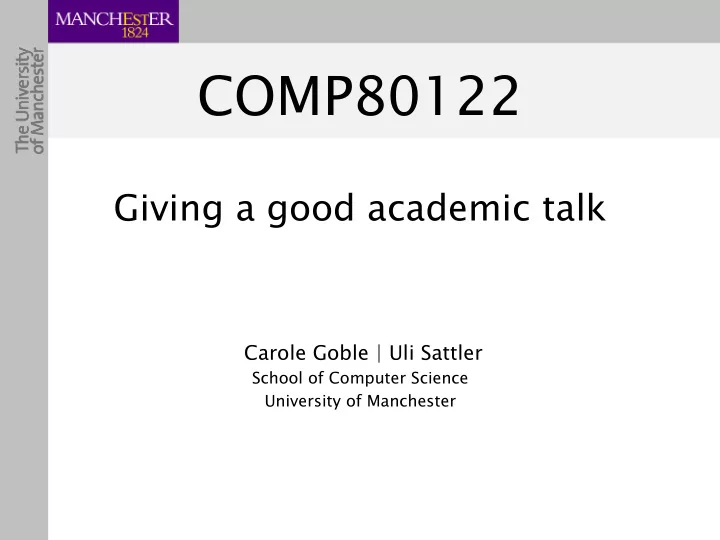

COMP80122 Giving a good academic talk Carole Goble | Uli Sattler School of Computer Science University of Manchester
Good Presentations Are clear and interesting (and fun)! • so, simply be clear, interesting, and fun... Remember • no rule fits everybody and • we need a lot of practice Don ’ t be Dull • so in the rest of COMP80122, we practice 2
Presentation Preparation Think about • who is your audience? • who are you? • how much time do you have? • what technical devices do you have/need? • What do you want them to take home ? What is the message? – New result? New technique? You are smart? 3
Presentation Structure • Try not to overwhelm with information • 3 point sermon • 3 part structure – Beginning, middle and end • 3 point repeat – Tell them, and again and again • Narrative and signposting 4
What is the story arc? 5
A typical presentation 1. Title slide (title, authors, affiliation, etc.) 2. The Take Home message? 3. Outline? Perhaps not: – costs valuable time – can be boring – is superfluous and redundant for short talks 4. Background 1. motivation, start using running example 2. related work, continue using running example 6
A typical presentation 4. Results summary of results • sketch of techniques • used to obtain these results further use of the • running example 5. Summary/Outlook/ Future Work The Take Home Message • 7
Presentation Preparation • Prepare good slides – Expect to throw away two thirds of your slides. – Use slides to deal with complexity • Think visual and high bandwidth info delivery – Analogies – Minimize words and maximize pictures. • 2 ways of saying the same thing • Long in advance: you need to – do some (practice;change) n , with n > 2 – have a friend/stranger listen/check – a good talk takes way, way, way longer to write than you think: 1 minute:1 hour rule. • Plan for whiteboard blindness 8
How does a clockwork clock work? “ It tells the time, mechanically ” 9
Before the presentation Get Situated. • Practice in the room • Practice with the set up • Preferably attend other presentations 10
Giving a presentation Be clear in: • what it is about – don’t make assumptions about what audience knows • the way you talk/present: – speak clearly, good tempo – speak loud enough – check faces of audience whether they can follow – practice with friends or a teddy bear 11
Giving a presentation • Speak to your audience, not your laptop or shoes • Read your audience • Don’t read out slides or notes • Listen to yourself • Don’t be cool. • Cool = bored • Don’t apologize • Be enthused • Mark start and end • Breathe 12
Cope with your nerves • (almost) everybody is nervous when giving a talk, but • we can use adrenaline to make talk more “sparkling” • we can find “tricks” to help... 13
Being Nervous. What doesn’t help • pretending the audience isn’t there • holding (and clicking!) a ball-pen • playing with the change in your pocket • using manuscript or presenter- cards • getting drunk • learning everything by heart – careful: you need to know what you want to say, but don’t recite • things you have seen? 14
Being Nervous. What can help. • Being well prepared • Pre-prepared a good mental picture of yourself in the presentation • Not being late • Breathing/drinking water • Pretending the audience is really friendly & interested • Knowing that it is o.k. to be nervous • things you have seen? 15
Handling Questions • Repeat the question • Rephrase the question • Admit if you don ’ t know the answer • Ask for suggestions (review interview)| • Beware getting trapped in a dialogue (research presentation) • Other thoughts? 16
On the fly adapting • The previous speaker has made your introduction. • Another speaker has presented work close to yours. • Not to acknowledge this gives a poor impression. 17
Gestures and Dress Code can matter • Check what is the dress code for your discipline/ audience – Smart for Medicine / Scruffy for Maths • Ladies – where something that can carry a microphone • Gestures are great for clarifying messages and animating the talk • But check the cultural taboos of gestures! 18
Your COMP 80122 presentation • 15 minutes, about your research • including background, motivation, hypothesis, aims, etc. • in small groups, with lots of feedback Useful Reading • http://www.cs.wisc.edu/~markhill/conference- talk.html • http://www.to-done.com/2005/07/how-to- give-a-great-presentation/ • http://www.cs.berkeley.edu/~jrs/speaking.html 19
The Take Home Message What is your Take Home Message to the particular audience? 20
Recommend
More recommend